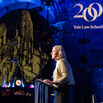MFIA Clinic Files Suit To Lift Gag Order on FBI Surveillance Tactic
The Media Freedom and Information Access Clinic (MFIA) —a program of Yale Law School's Abrams Institute for Freedom of Expression — has filed a lawsuit on behalf of Nicholas Merrill, asking the court to lift a decade-long gag order imposed on him by the Federal Bureau of Investigation (FBI). The lawsuit was filed in federal district court for the Southern District of New York on December 11, 2014.
Merrill has been barred from discussing his personal knowledge of FBI surveillance techniques since 2004, when the Bureau served him with a so-called National Security Letter (“NSL”) and imposed a gag order forbidding him from speaking about the NSL. More than ten years later, Merrill is still forbidden from discussing the kinds of records the FBI believed it could order him to divulge with the 2004 NSL. The lawsuit contends that this effectively permanent gag order violates his First Amendment right to free speech and that it also goes beyond anything that Congress meant to authorize.
NSLs are issued unilaterally by the FBI, without any prior judicial oversight, according to the clinic. “We are all now acutely aware of the incredible scope and sophistication of the Government’s surveillance powers, and open discussion of how those powers are used is more important than ever,” said Merrill, who is Founder and Executive Director of the Calyx Institute, a non-profit organization developing educational materials and associated technology to protect online privacy. “As part of that conversation, it is crucial for the public to understand the kind of information the FBI believes it can order online companies to turn over about their clients. Ten years after serving me with an NSL, the FBI still refuses to let me speak about what kinds of records it was trying to force me to turn over.”
"The First Amendment—and basic democratic principles—do not allow the Government to prevent citizens from openly discussing the FBI’s interpretations of the law and the scope of its claimed authority.” —Nicholas Handler ’15
The Government’s refusal to lift the gag is inconsistent with recent commitments it has made to offer greater transparency regarding surveillance in general and NSLs in particular, according to the clinic.
Lulu Pantin ’16, a student from the MFIA clinic, said, “In a January 2014 speech, President Obama pledged to reform the unnecessary secrecy imposed by NSL gag orders. He promised that gag orders would ‘terminate within a fixed time’ and ‘not be indefinite.’ But the Government continues to stifle its citizens from revealing what they know about domestic surveillance tactics. The decade-long gag on Nick Merrill’s speech makes it quite clear that the President does not intend to keep his promise.”
Merrill’s lawsuit seeks to vindicate his right to inform fellow citizens about the true scope of the surveillance authority the FBI claims under the NSL statute. The FBI has consistently refused to reveal how broadly its NSL authority sweeps when applied to online service providers, and it has gagged thousands of NSL recipients like Merrill from informing the public themselves, according to the clinic.
Nicholas Handler ’15, a law student working on the case, said, “By maintaining the gag order on Mr. Merrill, the Government is concealing how broadly the FBI construes its authority to force online companies to turn over information without a warrant under the NSL statute. The First Amendment—and basic democratic principles—do not allow the Government to prevent citizens from openly discussing the FBI’s interpretations of the law and the scope of its claimed authority.”
Merrill operated an independent Internet Service Provider in Manhattan when the FBI served him with an NSL a decade ago, demanding information about one of his clients. The NSL included a gag order forbidding Merrill from acknowledging that he had even received the letter and from discussing anything at all about its contents. In April 2004, Merrill, represented by the American Civil Liberties Union (ACLU), filed a major lawsuit challenging the NSL, the first of its kind. While that case resulted in a landmark ruling striking down the NSL statute’s gag provisions, Congress subsequently amended the law, and the court ultimately upheld most of the gag order, citing the need for secrecy in an ongoing investigation related to national security. In 2010, Merrill dropped his appeal of that decision when the government agreed finally to let him identify himself as the plaintiff in that lawsuit and recipient of the NSL.
The investigation that generated the 2004 NSL has long since ended. Earlier this year, Yale Law students representing Merrill negotiated with the Government to lift part of the gag order, permitting Merrill to identify the target of the 2004 NSL and other circumstances surrounding the issuance of the NSL. But the Government still refuses to allow Merrill to describe the various kinds of records that the FBI ordered him to turn over about his client. In negotiations, the Government made it clear that it does not intend to lift the continuing gag on Merrill in the foreseeable future, according to the clinic.
“While only a handful of lawsuits challenging NSLs have been filed, many thousands of NSLs are issued every year without any judicial oversight,” commented Matthew Halgren ’15, another law student assisting in Merrill’s representation. “Nearly all of those NSLs come with gag orders that forbid recipients to disclose how the FBI is using its authority. The First Amendment does not allow the Government to permanently prohibit an NSL recipient from telling his fellow Americans what kinds of information the FBI believes it can collect about them without a warrant.”
A copy of the complaint can be found here. In addition to law students Pantin, Handler and Halgren, Mr. Merrill is represented by Jonathan Manes and David Schulz, supervising attorneys in the Media Freedom and Information Access Clinic. The Floyd Abrams Institute for Freedom of Expression at Yale Law School promotes freedom of speech, freedom of the press, and access to information as informed by the values of democracy and human freedom.


